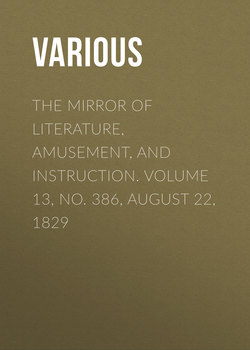Читать книгу The Mirror of Literature, Amusement, and Instruction. Volume 13, No. 386, August 22, 1829 - Various - Страница 2
ST. PETER'S CHURCH, PIMLICO
PSALMODY
Оглавление(To the Editor of the Mirror.)
I have lately made a journey to the metropolis for the purpose of inquiring by my own personal attention and otherwise, whether any improvement had been made in the Psalmody of any of the numerous new churches and chapels in and near London. I have visited by far the greater part of them. In many of them I find no improvement, but there are two or three which merit distinction.
In the majority of the churches, I observe the singing of psalms or hymns (for I have not yet, after three months, heard an anthem) is confined generally to about three verses, and those more ordinarily of the common metre; the singing is very little of it congregational, but is chiefly performed by the schools of charity children, and there does not appear to have been any instruction for their singing in any other than the treble. The organists in general are very good performers, but, however well that office is filled, the voices of the congregation are wanting, by which a great improvement would be given to the harmony. In two of the congregations I happen to have a more numerous acquaintance, and know that numbers of the congregation have excellent judgment and good voices, and many are good performers on the piano-forte and harp. In conversing with several of them on this interesting and (to me) sublime subject, I have heard as an objection to their joining in the psalmody with any extensive power, that there are no persons, exclusively of the organist, to lead the voices, whether treble, counter, tenor, or bass, and yet what a delightful opportunity do these new churches afford; in general the sound is well and equally distributed.
The sublimity of this part of divine worship has been well expressed by many of our poets, translators, and versifiers of the Psalms—one of them speaks the feelings of a sincere congregation when he says,
Arise my heart! my soul arise!
Jehovah praise! sing till the skies
Re-echo his ascending fame!
Rejoice and celebrate his name!
this does not admit of a deadly silence in the churches; and another excellent appeal to the true believer is made in the following beautiful and sublime act of devotion:—
Salvation! let the echo fly!
The spacious earth around!
While all the armies of the sky!
Conspire to raise the sound.
It is the conviction not only of myself but of others who are in the same order of the musical profession, that the means of drawing forth the universal voices of congregations is by a number, not less than four, nor more than twelve, being appointed by the authority of the clergyman or minister, to sing with correct harmony, and with rather a louder tone than they might do if only an ordinary singer in the worship of the day as a congregational attendant. Those four (or more) voices would have the effect, in a few months, of producing a great improvement in the singing by the congregation at large; but such an appointment must not be alienated from its main purpose. These voices, scientifically as they will be exercised, must not sing in solos, duos, trios, or quartettes; they must be faithful to their institution, and must lead the congregation; not merely exhibit themselves, like the professional singers in the Roman Catholic chapels, but direct the voices of all that may feel the animating force of the 89th Psalm—
Lord God of hosts thy wond'rous ways,
Are sung by saints above!
And saints on earth their honours raise
To thy unchanging love!
The only instance I have met with in any of the London churches or chapels of the Church of England (there may be others) is at the St. James's Chapel, near Mornington Place, on the road to Hampstead. I attended at that place of worship lately, and was delighted with the whole of the services, wishing only that greater numbers of the congregation had joined in the singing, which was conducted precisely on the principle of four being appointed to lead the congregation: the four voices were excellent, and naturally and easily led many to join, and I cannot doubt, but that this superior arrangement, whoever was the author, will tend to make the singing in that chapel an example to many others.
I lament that I am obliged to leave town, and may not be here again for several months, but when I do, I shall humbly offer my services to the clergyman of the chapel, for the improvement of so judicious a plan, and extending it to other chapels of the same parish.
I should offer some apology for not having noticed the discourses, though my remarks originate and have been chiefly confined to the psalmody. I will not, however, let this opportunity pass of saying the sermons, both morning and evening, were excellent, the attention of every part of the congregation was great; throughout all the services there was, while the minister was speaking, and the people not required to join, a most interesting but attentive silence, and in the evening I retired with a sympathetic feeling which I cannot describe.
In my next (should this receive your attention) I shall send you a few remarks on the psalmody of the new churches of Marylebone and Trinity.
CHRISTIANUS,
A Cathedral Chorister.
